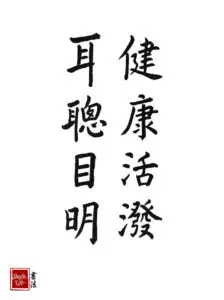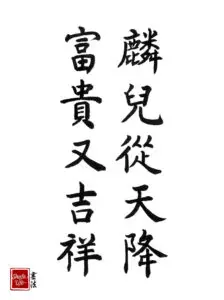For the Chinese, family is the center of society. A new birth may bring relatives and friends, near and far, to mark the happy occasion. Such celebrations are often as infrequent as gatherings reserved for Chinese New Year or weddings. Thus birth within a family holds special meaning for a community and is connected to several customs and rituals.
Naming The Baby
3 days after birth, the baby will have a bath, and names are given to the newborn. Two names are given to the baby, a nickname, which is used before starting school; the other is its formal name. It is believed that a baby’s name can foreshadow the future. The parents will consult a fortune teller to calculate the baby’s birth time and work out the element (of the 5 elements water, metal, wood, earth, fire) that the baby lacks. When choosing a name this element will be incorporated in some form.
The 100 Day or 1 Month Birthday Celebration
The one-month celebration is the first important occasion for a newborn. In Taoist or Buddhist families, the morning of a baby's 30th day after birth, sacrifices are presented to gods so that they will protect the child in its later life.
The 1 month mark(滿月)is an important milestone not only for the baby but for the recovery of the mother. In fact for that entire month, traditionally mothers are supposed to rest and be taken care of.
Considering high infant mortality rates in ancient times, reaching the one month mark was cause for celebration. In modern times, the one month mark is still quite a feat! With the recognition that early exposure to outside germs should be minimized, celebrations have been pushed to the 100 day mark.
Korean tradition has always considered the 100th day or Baek-il to be an important day to celebrate. Perhaps it has to do with the harsh winters, but newborns were not even taken outside until the 100th day. The 100 day traditional celebration has also caught on across Chinese cultures in modern times.
Proud parents give auspicious objects during the celebration to well-meaning friends and relatives. Red eggs are selected as gifts for guests as they symbolize life’s changing process. Their circular shape symbolizes happy and harmonious life. Red signifies good luck, fortune, and happiness in Chinese custom.
Boil 12 eggs at once, then dye the outside with red food coloring. Another way to do this is to wet red calligraphy paper and wipe it on the eggs to spread pink coloring.
Chinese Baby Birthday Celebration Etiquette
The Don’ts
- Do not dress in black or white clothes because these colors are traditionally linked to mourning. You are encourage to dress in red, which has positive connotations of happiness, warmth, prosperity, virtue, sincerity, and truth.
- Don't offer certain gifts, such as scissors, clocks, and pears, since they hold a bad connotation in Chinese customs.
The Do’s
- When you do give gifts, hand the present to the individual with both your hands. Gifts are considered as an extension of the one giving and using both hands shows respect. The same goes for accepting a gift, thus accept with your two hands and express your appreciation.
- When holding surprise baby shower before its birth, you need to be aware that traditionally, this would be taken as bad luck to have a shower before a baby’s birth. It may be better to let the grandparents organize the first month and 100-day festivity. Do consult the wishes of the mother first.
Chinese Gift Giving Traditions
Gifts are customary in a 100 day celebration or the first time seeing an infant, similar to Western culture. In addition to the gift choice, the amount you spend on it, how it is wrapped and presented are equally important according to Chinese culture.
Ideally the gift would be wrapped in a red paper or a red packet to symbolize good luck and then presented to the recipient with both hands. Here are a few gift ideas that honor Chinese etiquette.
Lucky Money
Lucky money placed in a Chinese red envelope is the most traditional and common gift for the fortunate occasion of a child's birth. The amount given should end with an even number while favoring the auspicious number eight. Giving $88 or an amount with "88" in it signifies wishing the recipient double fortune and blessings.
This pretty red packet has the print of the Year of The Dog, The adorable and trendy design makes your packet stand out among other traditional red packets.
Gold Jewelry
Countless families celebrate a new baby’s life using a bracelet or necklace decorated with a long life lock, an ideal traditional gift for most 1 month old children. The lock in Chinese culture serves as a sign of shield, which supposedly helps to ward off evil.
Jade Jewelry and Charms
Jade, a symbol of protection is usually made into charms or bracelets and gifted to the newborn. Most people like gifting the newborn with jade jewelry shaped in its Chinese astrology symbol, such as monkeys, pigs, dragons or rats.
Jade is considered by the Chinese to fight off bad luck and evil. This jade pendant has the design of the Year of the Dog, representing the baby’s horoscope if he is born in 2018.
Jade is considered by the Chinese to fight off bad luck and evil. This jade pendant has the design of the Year of the Dog, representing the baby’s horoscope if he is born in 2018.
Jade is considered by the Chinese to fight off bad luck and evil. This jade pendant has the design of the Year of the Dog, representing the baby’s horoscope if he is born in 2018.
Peach Wood Ornaments
The Chinese believe that peach wood will ward off evil spirits and therefore, an ideal and significant gift for an infant.
This gift is not only made out of peach wood but it is gourd shaped. The gourd 葫芦 (hú lu) is actually one of the oldest crops in the world, having been discovered 7000 years ago. In certain dialects the gourd shares the same sound as "fortune" and "luck", and even looks similar to the lucky number 8. The auspicious gourd here is carved with symbols of family prosperity and happiness.
Lucky Sayings
Chinese people like to welcome "new young scholars" in the family with auspicious sayings.
This Chinese saying 健康活潑,耳聰目明 means healthy, lively, and perceptive. It sends well wishes for a life of good health and a sharp mind. Often said or wished upon babies or kids!
Another blessing is "Fortune Arrives With A Child" 麟兒從天降,富貴又吉祥. This saying refers to lucky spirits descending from heaven, auspicious and fortunate. It refers to the fortunate birth of a child.
Conclusion
Many ancient traditions persist as a way for Chinese parents to initiate a newborn to friends and family. To welcome a new miracle of life, it's important to roll out the red carpet!
What traditions do your family keep when it comes to newborns?












